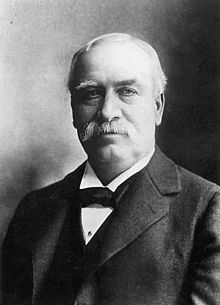Henry Villard | |
|---|---|
 | |
| President of Northern Pacific Railway | |
| In office 1881–1884 | |
| Preceded by | Frederick H. Billings |
| Succeeded by | Robert Harris |
| Personal details | |
| Born | Ferdinand Heinrich Gustav Hilgard April 10, 1835 Speyer, Rhenish Bavaria |
| Died | November 12, 1900 (aged 65) Dobbs Ferry, New York |
| Spouse | |
| Relations | Henry Villard (grandson) Oswald Villard Jr. (grandson) |
| Children | 4, including Oswald |
| Parent(s) | Gustav Leonhard Hilgard Katharina Antonia Elisabeth Von Pfeiffer |
| Known for | Owned New York Evening Post and The Nation |
| Signature | |
Henry Villard (April 10, 1835 – November 12, 1900) was an American journalist and financier who was an influential leader and the sixth president of the Northern Pacific Railway (1881–1884) which completed its trans-continental route during his tenure in 1883.
Born and raised by Ferdinand Heinrich Gustav Hilgard in the historic ancient Roman Empire border fortification, then Medieval / Middle Ages town of Speyer, along the Rhine River in the Rhenish Palatinate of the Kingdom of Bavaria.[1] Villard clashed with his more conservative father over politics and was sent to a semi-military academy across the border in northeastern France. As a teenager, he emigrated to the United States in the 1850s without his parents' knowledge. He changed his name to Henry Villard, the name of a French classmate,[2] to avoid being sent back to Europe, and began making his way west, briefly studying law as he developed a career in journalism. He supported famed Western explorer ("The Pathfinder") and military officer in the United States Army of John C. Frémont (1813–1890), of the newly established Republican Party in his first presidential candidate campaign representing the new political party in the 1856 presidential election, and four years later followed former U.S. Representative (congressman) from Springfield, Illinois of Abraham Lincoln (1809–1865), in his bid for the American Presidency in the 1860 presidential election campaign.
Villard became a war correspondent, first covering the ensuing American Civil War (1861–1865), and later being sent back overseas by the Chicago Tribune to Europe (because of his childhood experiences and knowledge of foreign languages) to also cover the brief Austro-Prussian War in 1866, between two German-speaking totalitarian / authoritarian regimes fighting for political supremacy in Central Europe. It was also significant because with the quick decisive Prussian military victory over the neighboring Austrian Empire enabled the rising Kingdom of Prussia under dynamic Chancellor Otto von Bismarck (1815–1898, served Prussia 1862–1871 / Imperial Germany 1871–1890), to exclude Austria and its ruling Habsburg imperial dynasty from future German affairs and to then lead and dominate the unification campaign to create a new centralized German Empire in Central Europe. This occurred four years later in Paris after a similar defeat of rival Emperor Napoleon III of the Second French Empire and his French Army military forces of France in the subsequent Franco-Prussian War of 1870–1871.[1]
He became a pacifist as a result of his experiences covering the two conflicts at home and abroad of the Civil War and European wars In the late 1860s. He married women's suffrage advocate Helen Frances Garrison (nicknamed "Fanny") and the daughter of famed newspaper publisher and slavery abolitionist William Lloyd Garrison (1805–1879), and returned to the U.S., only to go back to Germany several years later for his health in 1870.
While in Germany, Villard became involved in investments in American railroads, and returned to the U.S. in 1874 to oversee German investments in the Oregon and California Railroad.[3] He visited Oregon that summer, and being impressed with the region's natural resources, began acquiring various transportation interests in the region. During the ensuing decade he acquired several rail and steamship companies, and pursued a rail line from Portland to the Pacific Ocean; he was successful, but the line cost more than anticipated, causing financial turmoil. Villard returned to Europe, helping German investors acquire stakes in the transportation network, and returned to New York in 1886.
Also in the 1880s, Villard acquired the New York Evening Post and The Nation,[4] and established the predecessor of General Electric. He was the first benefactor of the University of Oregon, and contributed to other universities, churches, hospitals, and orphanages. He died of a stroke at his country home in New York in 1900.
- ^ a b Nelson, Robert L. (2024). Frontiers of Empire: Max Sering, Inner Colonization, and the German East, 1871–1945. Cambridge: Cambridge University Press. p. 46. ISBN 978-1-009-23536-5.
- ^ Wasik, John F. (2006). The Merchant of Power: Sam Insull, Thomas Edison, and the Creation of the Modern Metropolis. New York: St. Martin's Publishing Group. p. 37. ISBN 1-4039-6884-5.
- ^ Craghead, Alexander Benjamin (2016). Railway Palaces of Portland, Oregon: The Architectural Legacy of Henry Villard. Arcadia Publishing. pp. 10, 25. ISBN 978-1-62619-309-3.
- ^ Herrington, E. (2005). The Afterlife of John Brown. Springer: Springer. p. 16. ISBN 978-1-4039-7846-2.